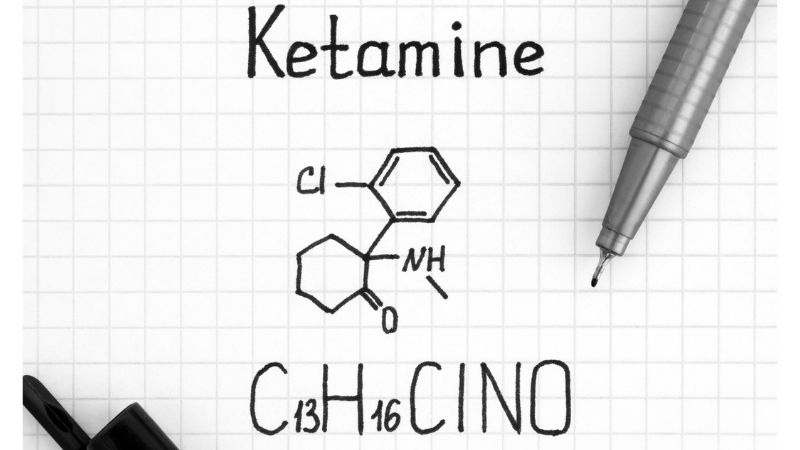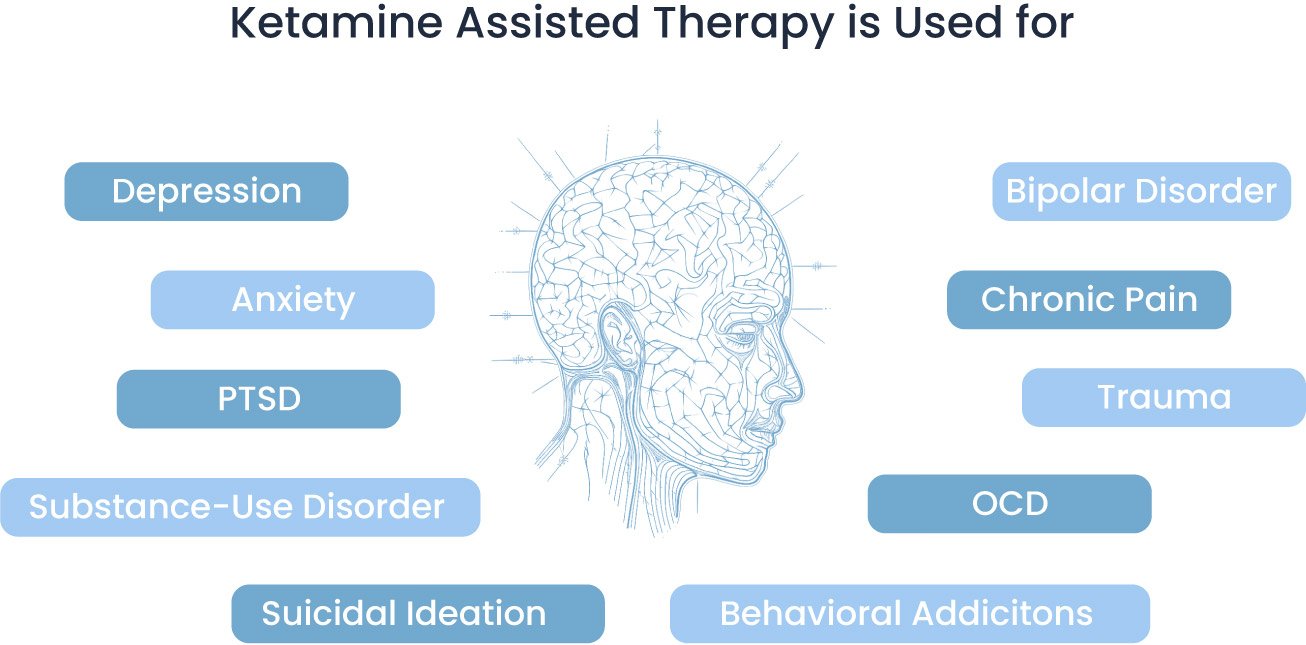Have you ever felt like traditional mental health therapies are walking a well-trodden path, yet somehow missing the mark? In a world where mental wellness is increasingly sought after, yet often elusive, a ground-breaking approach is making waves: Ketamine Assisted Psychotherapy (KAP). This innovative therapy is redefining the landscape of mental health care, offering new hope where conventional treatments may have fallen short. At the forefront of this therapeutic revolution, we are proud to introduce our pioneering approach to Ketamine Assisted Psychotherapy, a beacon of hope for those seeking a different path to mental wellness.
The Evolution of KAP: A Journey from Anaesthetic to Therapeutic Breakthrough
The story of Ketamine Assisted Psychotherapy (KAP) is a fascinating tale of medical innovation and scientific discovery. It’s a journey that began in the operating rooms and has since found its place in the therapist’s office, offering a new ray of hope for those grappling with mental health challenges.
Historical Background: Ketamine’s Remarkable Transformation
Ketamine, originally developed in the 1960s, was primarily used as an anaesthetic in medical settings. Its reliability and safety profile made it a staple in surgeries and pain management. However, it wasn’t long before clinicians and researchers began to notice something intriguing about this medication. Patients receiving ketamine for anaesthesia reported significant improvements in their mood and a decrease in depressive symptoms, even in cases where traditional antidepressants had failed.
This serendipitous discovery spurred a wave of interest in the psychiatric community. Could a surgical anaesthetic really hold the key to treating some of the most stubborn mental health conditions?
Scientific Milestones: Validating KAP’s Efficacy
The journey from anaesthetic to antidepressant wasn’t a straightforward one. It required rigorous scientific investigation to understand how ketamine could be safely and effectively used outside the operating room. The early 2000s marked a pivotal moment in this journey. Researchers began conducting controlled trials, examining ketamine’s effects on mood disorders. The results were nothing short of ground-breaking.
Studies consistently showed that low doses of ketamine, administered under controlled conditions, had rapid antidepressant effects, even in patients who had not responded to conventional treatments. Unlike traditional antidepressants that take weeks to show effects, ketamine’s impact was often felt within hours. Furthermore, ketamine seemed to work by a completely different mechanism than existing antidepressants, opening up new avenues for understanding and treating mental health disorders.
These scientific milestones have not only validated the efficacy of KAP but have also revolutionized our approach to mental health treatment. Ketamine’s ability to rapidly alleviate symptoms has made it a valuable tool in treating depression, anxiety, PTSD, and other mental health conditions, offering hope to those who had previously found little relief.
As we continue to explore and understand the full potential of Ketamine Assisted Psychotherapy, its evolution stands as a testament to the relentless pursuit of better mental health treatments. From its humble beginnings as an anaesthetic to its current role as a transformative psychotherapeutic tool, KAP’s journey is a remarkable example of how science and medicine can come together to open new doors in mental health care.
Understanding Ketamine Assisted Psychotherapy: A Synergistic Approach to Mental Wellness
Ketamine Assisted Psychotherapy (KAP) represents a significant advancement in the treatment of various mental health conditions. To truly appreciate its impact, it’s essential to understand how it works, both as a pharmacological agent and as a component of psychotherapy.
Mechanism of Action: Ketamine’s Role in the Brain
Ketamine Assisted Psychotherapy (KAP) leverages the complex and multifaceted mechanisms of ketamine in the brain, offering a novel and effective approach to treating various mental health conditions. Understanding ketamine’s action, including its influence on Brain-Derived Neurotrophic Factor (BDNF), provides a comprehensive view of its therapeutic potential.
Ketamine’s Multidimensional Role in the Brain
Imagine your brain as a network of highways. In conditions like depression, anxiety, or PTSD, these highways can become blocked or damaged, disrupting the normal flow of thoughts and emotions. Ketamine acts as a powerful tool, repairing and constructing new pathways within this network, akin to clearing and rebuilding roads for smoother mental traffic.
Scientifically, ketamine primarily interacts with NMDA receptors in the brain, differing from traditional antidepressants that target the serotonin system. Instead, ketamine modulates glutamate, the most abundant neurotransmitter in the brain. By blocking NMDA receptors, ketamine triggers a cascade of biochemical events, leading to the release of neurotransmitters and growth factors. This ‘resetting’ of certain brain areas results in rapid improvements in mood and thought patterns, particularly beneficial for various neuroses like anxiety or PTSD.
Expanding the Understanding: Beyond NMDA Receptor Interaction
Ketamine’s impact extends further:
– Anti-Inflammatory Properties: Ketamine’s significant anti-inflammatory effects are crucial, given the link between chronic inflammation and mental health disorders. Reducing brain inflammation can alleviate symptoms of depression and anxiety.
– Promotion of Neuroplasticity: Ketamine enhances neuroplasticity, the brain’s ability to form new neural connections, vital for recovery from mental health disorders.
– Influence on Monoamines: Ketamine indirectly affects monoamines (e.g., serotonin, norepinephrine, dopamine), enhancing monoaminergic signaling and aiding in mood elevation.
– Balancing Glutamate and GABA: Ketamine modulates the balance between glutamate and GABA, maintaining healthy brain function essential for stabilizing mood.
The Role of BDNF and Ketamine’s Influence
A key aspect of ketamine’s mechanism is its effect on Brain-Derived Neurotrophic Factor (BDNF). BDNF is a protein that plays a critical role in neuroplasticity, helping to support the survival of existing neurons and encouraging the growth and differentiation of new neurons and synapses. In many mental health disorders, levels of BDNF are often reduced, leading to impaired neural functioning.
Ketamine has been shown to rapidly increase BDNF levels in the brain. This increase in BDNF can lead to the strengthening of neural pathways that are vital for healthy cognitive and emotional functioning. The enhanced neuroplasticity, driven by increased BDNF, allows patients to form healthier thought patterns and behaviors, contributing to long-term improvements in mental health.
In summary, ketamine’s multifaceted impact on the brain—through its interaction with NMDA receptors, anti-inflammatory properties, promotion of neuroplasticity, effects on monoamines, balancing of glutamate and GABA, and particularly its influence on BDNF—underscores its potential as a powerful tool in mental health treatment. These mechanisms contribute to rapid and sustained improvements in mood, cognitive function, and overall mental well-being in patients undergoing Ketamine Assisted Psychotherapy, offering a new horizon of hope for those seeking effective treatment options.
The Psychotherapy Component: Enhancing the Effectiveness of KAP
The role of psychotherapy in KAP cannot be overstated. While ketamine opens the door to new neural pathways, psychotherapy helps guide and solidify the positive changes. This combination allows for a more profound and sustainable healing process.
During KAP, psychotherapy is tailored to complement the unique effects of ketamine. It provides a supportive space for patients to explore and integrate their experiences during and after ketamine sessions. This can involve discussing insights gained, processing emotions, and developing new coping strategies. The therapist’s role is crucial in helping patients make sense of their experiences and apply them to their journey towards mental wellness.
The KAP Process: A Typical Session
A typical KAP session involves several stages, each designed to maximize the therapy’s effectiveness:
- Preparation Before the session, the therapist will discuss your goals and expectations. This stage sets the groundwork for a successful experience.
- Administration Ketamine is administered in a controlled, safe environment via an intramuscular injection usually in the shoulder. The dose is carefully calibrated to your individual needs.
- The Ketamine Experience: During the ketamine administration, you might experience a range of sensations, from relaxation to a dissociative state. This phase allows for psychological exploration and the breaking down of mental barriers.
- Integration: Post-administration, you’ll engage in a psychotherapy session. This is where the real work happens – integrating your ketamine experience with therapeutic guidance. It’s a time to process, reflect, and understand the insights gained during the session.
- Follow-Up: After the session, there will be follow-up appointments to assess progress and plan future sessions if needed.
In summary, Ketamine Assisted Psychotherapy is a revolutionary approach that combines the rapid-acting, neurologically restorative properties of ketamine with the depth and personal growth fostered by psychotherapy. This synergistic combination offers a powerful tool in the treatment of various neuroses, providing a path to recovery that is both innovative and deeply rooted in understanding the complexities of the human mind.
Expected Outcomes and Benefits of Ketamine Assisted Psychotherapy
Ketamine Assisted Psychotherapy (KAP) has emerged as a beacon of hope in the mental health landscape, offering new possibilities for those who have found limited relief with traditional therapies. The effectiveness of KAP is not just anecdotal; it is backed by robust clinical evidence and heartening success stories.
Clinical Evidence: The Transformative Impact of KAP
A growing body of research has illuminated the effectiveness of KAP in treating a range of mental health conditions. Studies have consistently shown that KAP can lead to rapid reductions in symptoms of depression, anxiety, and PTSD, often where other treatments have failed. One landmark study reported that over 70% of participants with treatment-resistant depression experienced a significant reduction in symptoms after KAP. Another key finding across multiple studies is the rapid onset of relief, often within hours or days, compared to the weeks or months typically required for traditional antidepressants.
Patient Testimonials: Real Stories, Real Impact
Beyond the numbers, the true essence of KAP’s impact is best captured through the experiences of those who have undergone the therapy.
– “After years of struggling with severe depression, KAP felt like a light in the darkness,” shares John, a 45-year-old patient. “It’s not just about the symptoms easing; it’s about rediscovering hope and joy in life.”
– Emma, who battled chronic anxiety, recounts, “KAP helped me break free from the shackles of my anxiety. It was like a reset button for my brain, and therapy helped me build a new, healthier way of thinking.”
These stories underscore the profound and life-altering benefits that KAP can offer, providing not just symptom relief but also a renewed sense of purpose and well-being.
Addressing Misconceptions: Understanding KAP Correctly
Despite its promising results, there are misconceptions about KAP that need clarification:
- Addictive Potential: A common concern is that ketamine, due to its history as a recreational drug, might be addictive. However, in the controlled, medical setting of KAP, ketamine is administered in low, therapeutic doses, significantly reducing any risk of addiction. Moreover, the supervised medical environment and the absence of repeated, recreational use patterns distinguish KAP from illicit drug use. To be addicted to ketamine requires high use 5-7 times a week for several months, this is highly unlikely with our safety protocols.
- Party Drug” Stigma: Ketamine’s reputation as a “party drug” often overshadows its therapeutic potential. It’s important to differentiate between the misuse of any substance in an uncontrolled setting and its carefully monitored medical use. In KAP, ketamine is used as a part of a structured therapeutic program, under strict medical supervision, and for a very different purpose – to heal, not to escape.
Ketamine Assisted Psychotherapy stands as a testament to the advancements in mental health treatment. By offering rapid, effective relief in a safe and controlled environment, KAP is rewriting the narrative for individuals struggling with mental health conditions, providing a path to recovery that is both scientifically sound and deeply transformative.
Our Pioneering KAP Clinic: A New Chapter in Mental Health Care
We are thrilled to announce a significant milestone in the journey of mental health treatment: the opening of our pioneering Ketamine Assisted Psychotherapy (KAP) clinic, the first of its kind outside London. This new facility is not just a clinic; it’s a symbol of hope and progress in the field of mental health care, embodying our commitment to innovation, accessibility, and holistic treatment.
Our Mission: Making KAP Accessible and Affordable
At the heart of our mission is the belief that ground-breaking treatments like KAP should be within reach for everyone who needs them. We understand that affordability can be a barrier to accessing quality mental health care. That’s why we’ve dedicated ourselves to creating a pricing structure that makes KAP accessible without compromising the quality of care. Our clinic is committed to providing this life-changing therapy to as many individuals as possible, ensuring that financial constraints do not stand in the way of mental wellness.
Unique Features: Setting Our Clinic Apart
Our KAP clinic is designed to provide an experience that goes beyond traditional therapy settings:
– Experienced and Compassionate Staff: Our team comprises highly trained and empathetic professionals who specialize in KAP. They are not just experts in their fields; they are passionate advocates for mental wellness, dedicated to providing personalized care to each patient.
– Serene and Healing Environment: We believe that the environment plays a crucial role in the therapeutic process. Our clinic is designed to be a tranquil oasis, a place where patients can feel safe and relaxed.
– State-of-the-Art Facilities: Equipped with the latest technology and amenities, our clinic ensures that every aspect of the KAP process is conducted with the utmost precision and care. We adhere to the highest standards of safety and efficacy, ensuring that our patients receive the best possible treatment.
Our new KAP clinic is more than just a medical facility; it’s a place where healing begins, and hope is restored. We invite you to join us in this exciting new chapter, as we open the doors to a brighter, healthier future for those seeking mental wellness. Welcome to a place where care, science, and compassion meet to create a transformative therapy experience.
Embark on Your Journey to Wellness with KAP
As we reach the end of our exploration into the world of Ketamine Assisted Psychotherapy, we hope you feel inspired and informed about the potential of this ground-breaking therapy. KAP stands at the forefront of mental health innovation, offering new hope and possibilities for those who have struggled to find relief through traditional methods.
A Gentle Invitation to Discover More
We warmly invite you to delve deeper into the world of KAP and discover how it might illuminate your path to mental wellness. Whether you’re seeking more information, curious about how KAP could fit into your unique journey, or ready to take the first step towards a consultation, our doors are open, and our team is ready to welcome you with empathy and expertise.
Revisiting the Transformative Power of KAP
Remember, KAP is more than just a therapy; it’s a catalyst for profound change. It offers rapid relief from debilitating symptoms, fosters deep emotional healing, and paves the way for a renewed sense of hope and joy in life. At our clinic, we don’t just administer a treatment; we embark on a journey with you, supporting you every step of the way towards achieving lasting mental wellness.
A Hopeful Horizon: The Future of Mental Health and KAP
As we look towards the future, we see a world where mental health care is more accessible, effective, and compassionate. KAP is a significant stride in this direction, and we are proud to be part of this transformative movement. Together, we can redefine what it means to seek help, to heal, and to hope.
Your journey to wellness is unique, and Ketamine Assisted Psychotherapy could be a key part of that journey. We are here to help illuminate the path. Let’s embrace the possibilities together and move forward into a future where mental health is nurtured, understood, and compassionately cared for. Welcome to a new chapter in your life, one filled with hope and healing.
Think you will benefit from Ketamine Assisted Psychotherapy?
Then fill in the form below so we can have a discussion about how KAP can make you feel better!




